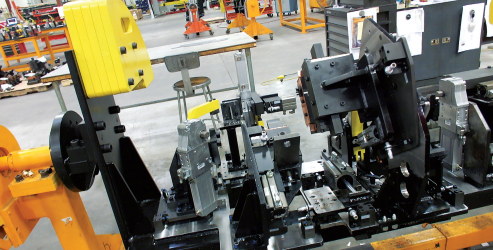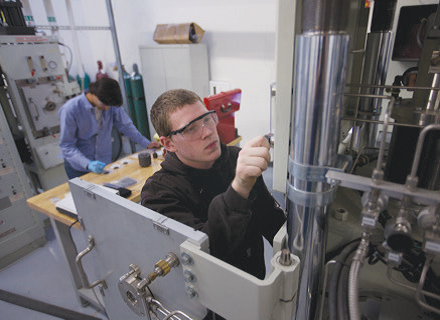
Curt Burnett sees his job two ways: he is both the pilot of a “connection machine” and a regional navigator, charting a long-range course toward the future for Quad Cities manufacturing.
The complicated part is that Burnett, executive director of the relatively new Quad Cities Manufacturing Innovation Hub, is doing both things while the machine is still being built.
The Quad Cities Manufacturing Innovation Hub, formally launched last fall, is designed to be part planning organization and part business outreach. Supporters envision an organization that eventually will know nearly everything about the capabilities of Quad Cities manufacturers and therefore will be able to tackle items such as workforce and technology problems on a massive, regionwide scale. Building that scope will take years, however. So Hub officials right now are working to solve immediate needs by matching manufacturers with a host of experts who can make those businesses better.
CIRAS, a formal partner with the Hub, is slated to play a key role.
“I’m their connection to resources that are available to Iowa manufacturers,” said Glenn Volkman, CIRAS account manager for the Quad Cities region. “Our role in this is to be service providers and to partner with them on new services that can be provided.”
“We talk about us being the Sherpa,” Burnett said of his organization. “We’re going to hold [businesses’] hands the whole way. But we’re going to need specialists to help us with different parts of the journey.”
The journey of the Quad Cities Manufacturing Innovation Hub formally began in August 2015, when the 6-year- old Quad Cities Chamber of Commerce officially launched its new entity out of the chamber’s Davenport office.
 Paul Rumler, the chamber’s former chief economic development officer, described it then as a tool to speed development of the 900-some manufacturing companies who exist within a 80-mile radius of the Quad Cities. Manufacturing makes up 18 to 20 percent of the regional economy, according to Rumler, while providing roughly 16 percent of its jobs. Many of those are small companies who soon could face new requirements from their customers to do business in newer, more high-tech ways.
Paul Rumler, the chamber’s former chief economic development officer, described it then as a tool to speed development of the 900-some manufacturing companies who exist within a 80-mile radius of the Quad Cities. Manufacturing makes up 18 to 20 percent of the regional economy, according to Rumler, while providing roughly 16 percent of its jobs. Many of those are small companies who soon could face new requirements from their customers to do business in newer, more high-tech ways.
“It’s our job to look over the horizon,” Rumler said in February. “There is a litany of technology needs that will be coming over the next few years… If we can ensure that the majority of our manufacturers are digital ready, then we’ll be in a really good place.”
Toward that end, the Hub in November announced a partnership with the Chicago-based Digital Manufacturing and Design Innovation Institute (DMDII), a $320 million public-private partnership created to tackle various manufacturing issues using digital design technology. The relationship means Quad Cities businesses will have early access to promising new technology, while DMDII researchers will get to test new methods in a regional economy.
The Quad Cities Chamber of Commerce also is partnering with the University of Illinois, John Deere, and others to perform a $5.5 million assessment of “Illinois communities that have been adversely impacted by changes in federal defense spending.” Combined with other grants, the assessment means Burnett’s organization will spend the next few years painstakingly developing a comprehensive assessment of Quad Cities manufacturers, what they can do, and what they need—as well as trying to pinpoint the high-priority areas where more resources should be focused.
“What we’re trying to do is map the assets—all of the manufacturing assets that are in eastern Iowa and western Illinois—and understand what are our strengths, weaknesses, opportunities, and threats,” Burnett said. “Basically, we’re going to ask what technologies are going to be most important to manufacturing in the future. So when we go to diversify, we can plan for the future.”
For example, one possible role for the Hub would be to form cooperatives so that many small manufacturers can lower modernization costs and share time on expensive machinery.

“This really gets visionary in a hurry,” Burnett said. “What we’re really trying to do is create this manufacturing ecosystem… It’s a world where all the key economic players understand what the drivers are, and they’re all playing
their roles. It really is a Silicon Valley kind of an idea that we’re trying to create— one focused on manufacturing technology.”
Rumler and Burnett acknowledge that major benefits from this aspect of the Hub may be years away—although Burnett believes “it could happen actually quicker than you think, because there’s some really cool economies of scale that can be had. You just have to have somebody to herd the cats.”
Technology advancement means “everybody is going 100 miles an hour in the same direction,” he said. “What if we had somebody up in the control tower to make sure we’re sharing more?”
In the meantime, the Quad Cities Manufacturing Innovation Hub is reaching out to individual companies through entities such as CIRAS, Iowa Innovation Corporation, Iowa Lean Consortium, the University of Iowa, and various community colleges, as well as the Illinois Manufacturing Excellence Center, CIRAS’ sister affiliate for Illinois in the federal government’s Manufacturing Extension Partnership.
Volkman said CIRAS, following up on questionnaires circulated by the Quad Cities Chamber of Commerce, already has been working with companies to identify various needs. Some want help with Internet sales, he said, while some are being pushed by their business customers to upgrade equipment or achieve higher levels of certification.
“The recognition is that a lot of Iowa manufacturers are not digital ready,” Volkman said. “They’re not using computer-aided design. Their equipment is not hooked up to the Internet. So, another big push is to get some of these legacy companies up to date.”
Burnett believes the next few years will be essential to get Quad Cities manufacturers to take the Manufacturing Innovation Hub seriously and buy into its mission.
“If I can’t help you with your everyday problem,” he said, “then why are you going to worry when I tell you about a problem that might not occur for a few months or years?”
For more information about CIRAS’ role in the Quad Cities Manufacturing Innovation Hub, contact Glenn Volkman at gvolkman@ iastate.edu or 515-205-3786.
This article originally appeared in the Spring 2016 edition of CIRAS News. You can find the rest of this issue and more of CIRAS News on our website.